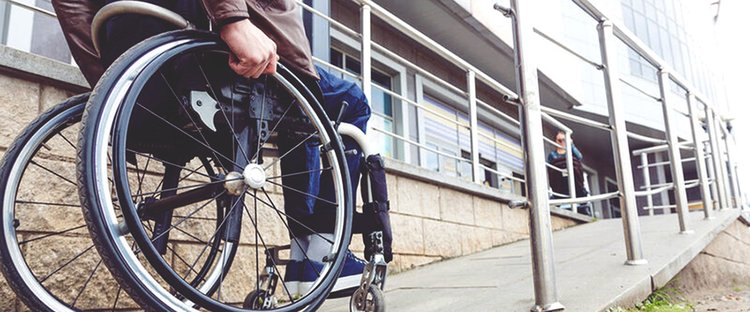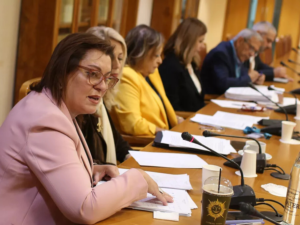
There is strong political will to shape special legislation for people with disabilities, aiming to disconnect allowances from the Guaranteed Minimum Income (GMI), stated Deputy Minister of Social Welfare Marilena Evangelou during the discussion on the matter in the Parliamentary Labor Committee.
As Mrs. Evangelou mentioned, a first meeting has already taken place with the Cyprus Confederation of Disabled People’s Organizations (CCDPO), and consultations will continue in early March to address overall issues of social inclusion, rehabilitation, participation, as well as social benefits and services. She noted that this would involve modernizing legislation and that she personally considers the disconnecting of benefits for disabled individuals from legislation on GMI as significant.
She further stated that the consultation is alive, substantive, ongoing, and more detailed recommendations from the CCDPO are expected to continue the consultation process.
On behalf of the Labor Committee, AKEL Member of Parliament Andreas Kaukalias stated that by the end of the discussion, the responsibility will lie with the Parliament to move forward.
CCDPO President Christakis Nicolaides mentioned that the issue dates back to 2014 when the previous Government proceeded with the GMI and disabled individuals lost nearly 40% of the support rights they received from the state.
He noted that they often submit detailed proposals on the issue and that the Deputy Minister convinced them of good intentions and effective communication. He expressed the desire for consultation to continue and mentioned that the President of the Republic urged them to submit their proposals within three months. He added that they have submitted a draft of recommendations to the Deputy Minister and a comprehensive memorandum is now being prepared.
He also mentioned that their request is to increase the state budget by €60 million to support people with disabilities. Without legislation, he added, Cyprus will lag behind and be the last country in Europe.
On behalf of the Pancyprian Organization for the Rehabilitation of Disabled People, Stelios Theophilou lamented the fact that the state expects them to bring legislation, while not a single public servant, as he said, has worked on the issue. He also urged MPs to propose laws on the matter.
The Deputy Minister of Social Welfare countered that it would be easier to draft a bill based on economic data; however, as she said, they want to take into account the needs of people with disabilities, hence they are proceeding with consultations with the CCDPO.
Several organizations of disabled people intervened in the Committee, requesting a new policy of allowances based on the relevant United Nations convention and emphasizing that the new legislation should not resemble the GMI. They also noted that current allowances do not ensure their standard of living.
President of the Cyprus Paraplegic Organization, Dimitris Lambriniadis, noted that while waiting for the new legislation, which will take time, some modifications need to be made to the provisions of the GMI to expand some benefits.
The intervention of people with mental illnesses, such as ADHD syndrome, was also significant, emphasizing the need to take invisible mental disabilities seriously, especially at young ages, to address them and avoid higher costs to society later on.
In statements, Committee President Andreas Kaukalias stated that the Deputy Minister’s position regarding strong political will on the part of the Government is recorded as positive; however, as he said, we need to move from theory to practice, and consultations with the disability movement need to proceed so that the bill can be submitted as soon as possible. He also said that the Committee will examine the issue every two months to assess progress.
DYSI MP Fotini Tsiridou said it would be good for the Deputy Ministry to consult with organizations that feel they are not being significantly considered. She also noted that what is offered for each disability should reflect the problem of each individual. She also said that it is important to consider invisible disabilities so that they do not become more serious in the future.
DIKO MP Christos Senekkis expressed shock at the experiential experiences and the greatness of the souls of people with disabilities. He added that they believe that consultation is the decisive step towards securing their rights to a decent living.
EDEK MP Andreas Apostolou said that for the first time, there is such great optimism for a resolution, adding that the Deputy Minister managed to convince them that they mean to conclude, and for this reason, a structured dialogue has begun. He also said that the new legislation should take into account the individual needs of each disabled person. He also said that in the meantime, some distortions need to be corrected, and consultation with other relevant ministries such as education and health is needed on issues of services for people with disabilities.
DIPA MP Marinos Mousiouttas welcomed the Government’s effort and said that some stable schedules should be set and adhered to. He estimated that the issue may have a positive conclusion soon.
ELAM MP Soteris Ioannou expressed hope for a positive conclusion to a longstanding issue. He also said that it does not need to be said by any organization for the relevant UN convention, which is not applied today regarding people with disabilities. He also said that disability scores are a leveling system that does not assess the needs of each disabled person.
Source: KYPE



